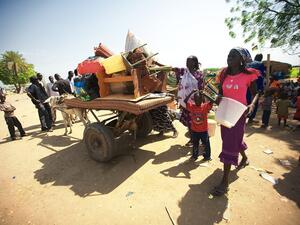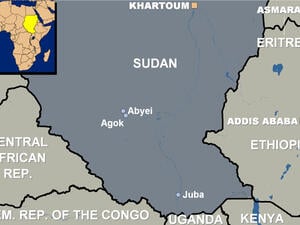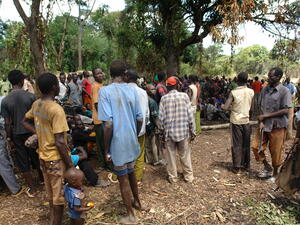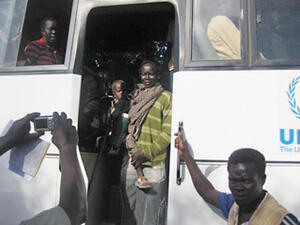Lord's Resistance Army drives thousands out of South Sudan
Lord's Resistance Army drives thousands out of South Sudan

Refugees who never fled Sudan's 21-year civil war are now fleeing attacks by the Ugandan Lord's Resistance Army for the squalor of Palorinya in northern Uganda.
PALORINYA, Uganda, April 29 (UNHCR) - More than two decades of civil war in his native South Sudan never managed to drive Yusuf Taban out of his home.
But two months after a peace agreement was signed, incursions by the notorious Lord's Resistance Army from northern Uganda finally turned 28-year-old Yusuf, his wife and their four children into refugees.
"We had no choice but to flee here," Yusuf said in a squalid makeshift refugee reception centre in northern Uganda. "On that dreadful night (of March 14), the women in my village were cooking and the rebels came with pangas (long knives). They snatched what they could carry and set our tukuls (traditional dome-shaped shelters) on fire." He feels lucky to be alive: "They came with the intention of completely killing us."
Yusuf is speaking his native Madi language, but no interpreter is needed for his hand gestures. Without any prompting, he graphically illustrates the horrific tale of what he saw - vicious knife blows to the back of the head, the forehead, neck, across the eyes, slicing off the ears of his neighbours. He says he saw 12 people hacked to death and some of their bodies burned.
The UN refugee agency has expressed concern that LRA attacks have contributed to the displacement of more than 4,000 South Sudanese from their country since the beginning of this year, just as the agency is preparing to help hundreds of thousands of their compatriots end their exile abroad and go home following the January peace accord.
The new refugees - who come from areas like Nimule, Juba and Torit - have been arriving in Palorinya in northern Uganda over recent weeks after a journey of 10 to 15 days by boat and on foot.
Most are in bad health when they arrive; several women have suffered miscarriages as the result of their arduous journey, and some small children have died upon reaching Palorinya. UNHCR and its partners give them food and medical treatment in the reception centre. The refugee agency is working with the Ugandan government to find land on which the recent arrivals can set up homes and begin farming.
It is tragic that these people, who managed to stay in their own country all through 21 years of civil war in South Sudan, are now being forced to flee.
In Palorinya, Yusuf has heard - and can repeat - the standard argument that now that peace has been signed between the Sudanese government in Khartoum and former Sudanese rebels of the Sudan People's Liberation Movement, Sudanese refugees should go home from neighbouring countries.
"But if you regard the Kony issue, there is no peace," he says, referring to Joseph Kony, leader of the Lord's Resistance Army, a force that says it seeks to overthrow the Ugandan government and install a regime based on the biblical Ten Commandments. Yet its trademark methods are kidnapping children to press them into service as soldiers and sex slaves.
They have forced 1.6 million Ugandans from their homes, and over the years frequently attacked settlements of Sudanese refugees inside Uganda. Their incursions into the Nimule area of South Sudan are increasing in frequency and brutality.

These recent arrivals from the Nimule area of South Sudan are now living in shelters made of dried palm fronds in Palorinya.
Helen, a young mother of four girls, was astonished to see women soldiers in camouflage uniforms among the rebels who attacked her village in the Pageri area, north of Nimule. Cuddling her own four-month-old daughter, Janet, as she talked, Helen said she saw three small children shot to death in the raid on her village.
The LRA rebels, she said, "took our food and our clothes, everything. They left us with nothing. They need to kill us."
Helen speaks surprisingly good English, learned on her own because, as she said, "the rebels did not let us go to school, so I just learned little English."
Eighteen-year-old Stephen Lopu, one of Helen's former neighbours, says the rebels are starving in the bush. "If we have some food, they will come and take it. They are very hungry." Then he adds: "Also, they like to kill people."
The recent arrival of so many Sudanese into Palorinya, in far northern Uganda, is distressing for UNHCR staff and other aid workers there who have been preparing for the return to Sudan of hundreds of thousands of refugees.
Now the hangars that were prepared for the send-off of hopeful people returning to Sudan are welcoming the traumatized newcomers from there.
"We cannot close the door," said Mawa Bashir, Deputy Settlement Commandant of Uganda's Office of the Prime Minister (OPM) in Moyo. OPM is the UN refugee agency's government counterpart in caring for refugees in Uganda.
"We have to receive them, listen to them and do what we can," Bashir says, adding pessimistically: "To me this will defeat the course of repatriation (to South Sudan)."
Certainly the recent arrivals at Palorinya have no intention of returning to Sudan any time soon. "After what I have seen, I will not go back as long as Kony's people are there," Yusuf says firmly.
Adds another recent refugee forlornly: "For us it's more terrible. We had a smell of peace and then the rebels came and it was gone."
By Kitty McKinsey in Palorinya, Uganda







